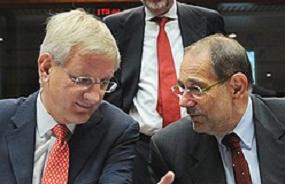|
World Jewish News

European Union foreign affairs and security chief policy
Javier Solana talks to Swedish Foreign Minister Carl Bildt
prior to the start of an EU Foreign Affairs Council of ministers.
Photo by JPost.com
|
Swedish FM: 'You can't expect us to agree on everything'
09.12.2009, Israel and the World Swedish Foreign Minister Carl Bildt on Wednesday morning denied that "any fundamental changes" had been made to a European Union statement on the Middle East, which stopped short of recognizing east Jerusalem as the capital of a future Palestinian state.
"That has been the intention all the time," Bildt told Army Radio, adding that the original draft, which was proposed by Sweden, had always aimed to recognizeJerusalem as the capital of two states, contrary to recent reports.
Sweden currently holds the rotating presidency of the EU.
He decried Israeli criticism of the Swedish government, and added, "I understand [Israel] hasn't been entirely happy with [US] President [Barack] Obama either. You can't expect us to agree on everything. We have to have an independent line, and we do have that. I have no problem being pro-Palestinian; I have no problem being pro-Israeli. I am pro-peace."
Foreign Minister Avigdor Lieberman was less positive in his attitude to the Swedes and their initiative, insinuating that Bildt's diplomacy was merely a cry for attention.
"I think there was an attempt not to pass a resolution but to snatch a resolution by the Swedish foreign minister," Lieberman toldIsrael Radio on Wednesday morning, elaborating that as Sweden is ending its term as president of the European Union "with no achievements and without making significant changes," Bildt "tried to steal the show and snatch the resolution. But it didn't work."
Regarding Tuesday's meeting of EU foreign ministers, at which the watered-down resolution was passed, Bildt said that "quite a number of different issues" had been discussed, including Jerusalem, which he called "one of the most critical" matters, final borders, and the matter of refugees.
The final text, hammered out at a meeting in Brussels attended by the EU's 27 foreign ministers, also expunged a reference to the Palestinian Authority as "Palestine," and gave more credit than the original text to Prime Minister Binyamin Netanyahu for his declaration of a 10-month housing-start moratorium in the West Bank.
"Encouraging further concrete confidence building measures, the Council takes positive note of the recent decision of the Government of Israel on a partial and temporary settlement freeze as a first step in the right direction and hopes that it will contribute towards a resumption of meaningful negotiations," the new text reads.
However, the text did not, as Israel had hoped, call on the Palestinians to return immediately to negotiations.
This omission was highlighted in the statement released by the Foreign Ministry, following the EU's publication of the text.
"The Statement by the Council of Foreign Ministers of the European Union ignores the primary obstacle to achieving a resolution between Israel and the Palestinians: the Palestinian refusal to return to the negotiating table," the statement said.
"Given the Israeli government's efforts to renew the negotiations, Israel regrets that the EU has chosen to adopt a text that, although containing nothing new, does not contribute to the renewal of negotiations."
The statement then went on to welcome the new text, while slamming the Swedes for putting forward an "extreme" proposal.
"In light of the extreme draft originally presented by the Swedish presidency at the start of discussions, Israel does welcome the fact that at the end of the process the voices of the responsible and reasonable EU states prevailed, balancing and improving the text,"the statement said.
The Foreign Ministry statement acknowledged that the new text took notice of measures Israel has taken to enable a renewal of negotiations, called for an end to arms smuggling into Gaza, and reiterated its commitment towardIsrael's security and integration into the region.
Among the leading countries who worked against the Swedish proposal were Italy, the Czech Republic, Romania, Hungary, Poland and - to a certain degree - France and Germany.
The Swedes were supported in efforts to get the proposal passed by England, Ireland, Luxembourg and Portugal.
By JPOST.COM STAFF. Herb Keinon contributed to this report
JPost.com
|
|
